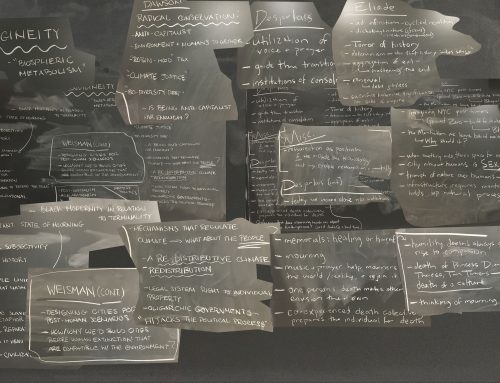Les U. Knight opened his introduction of the Voluntary Human Extinction Movement’s mission by referring to “the best thing for the earth’s ecosphere.” While speaking so broadly perhaps casts a wide net for support, it also occludes some of the realities that impact earth’s ecosphere and may not easily be addressed through voluntary human extinction. As Knight continued, referencing dramatic inequality by describing the reality that “half our human family isn’t doing so well,” he seemed to circle around the imbalances of power and historic marginalization that impact the earth’s ecosphere no less than generic, universal consumption. Such observations prompted a question for Knight, discussing how voluntary human extinction may be aligned with other approaches to ecological devastation, such as radically reducing consumption, and pursuing political and economic change. In response, Knight acknowledged that human extinction was “one major component,” within a myriad of means through which to pursue more ethical and temporarily sustainable living. “Capitalism feeds on our children,” Knight memorably remarked, “without them it would die.” While it is not difficult to support, or simply understand, the logic that if humans were to go extinct, capitalism would too, such a remark seems to present little hope for living human beings. When asked about how accepting anti-natalism reshapes our responsibilities or obligations to each other as living human beings, Knight responded that needing to take care of the present population is certainly one of the primary motivations for pursuing voluntary extinction. One may appreciate this intention, and perhaps agree, however it bears worth considering how focusing all energy on human extinction may push back present issues to be solved at a later date, and distracts from imagining new possibilities for more equitable, ecological ways of living that may be pursued before the distant goal of extinction is won.
Before We Go: Life In Anticipation of Human Extinction
By miri.powell|
2018-10-12T17:32:14+00:00
October 12th, 2018|Terminality|Comments Off on Before We Go: Life In Anticipation of Human Extinction

Recent Comments